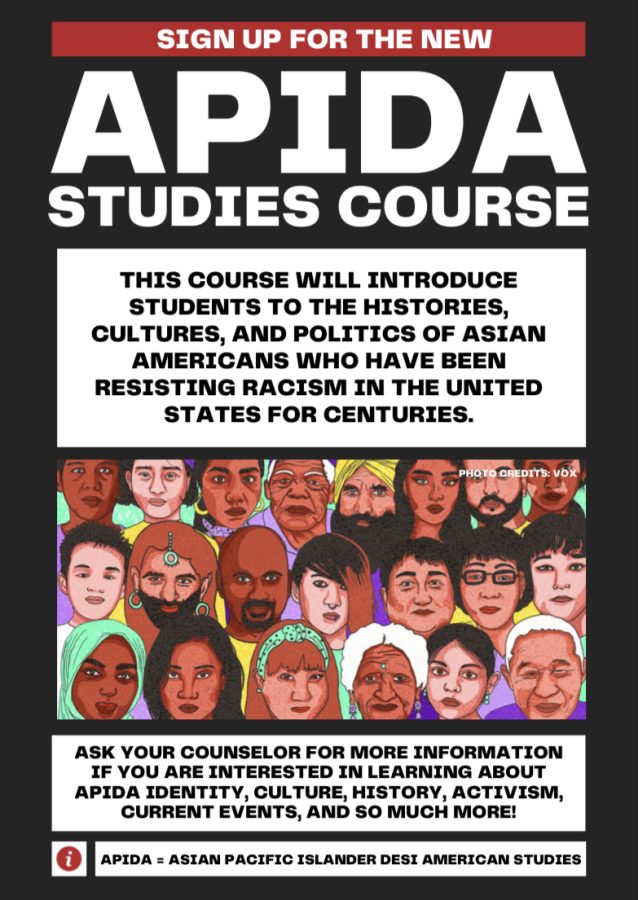New course highlights Asian-American diversity
Photo courtesy of Pragya Kumar.
This student made poster promotes the new APIDA Studies course being implemented in MCPS next year. Seven pilot schools including WCHS will offer this class.
February 25, 2022
With the recent success of the LGBTQ+ Studies course pilot program this year, MCPS takes another step in diversifying its course offerings with the Asian Pacific Islander Desi American (APIDA) Studies course being rolled out next year. Focused on showing that the Asian American community is not a monolith, this class will cover the culture, history and politics of the various groups that fall under the umbrella of the APIDA community.
Thanks to the efforts of co-creators Neha Singhal, the Staff Development Teacher at Bethesda-Chevy Chase High School, and Yonsoo Kang, an AP NSL teacher at John F. Kennedy High School, along with 16 dedicated MCPS students, this course was approved by the Board of Education this fall. This is a dream come true for Singhal, who wished that a course like this was available when she was an MCPS student herself.
“[I] always wished I could have learned about the history of South Asians in the U.S. and had a place to discuss how racism affected me and my community, especially after the 9/11 attacks. When I finally learned the history of Asian Americans (and why people from so many countries united under this banner in the U.S.) I felt I wasn’t alone in the things I had experienced and began to better understand myself,” Singhal said. “I am so hopeful that this course will allow the same for students to build community in MCPS, rather than waiting until much later in life.”
Since the APIDA Studies course idea itself was proposed to MCPS’s curriculum office, MCPS students were at the heart of this initiative. With the guidance of Singhal and Kang, a team of students met over the summer to help develop the curriculum and gather course materials. These students also worked on spreading awareness of the course by designing flyers and social media posts.
“Each of these students chose a specific Unit to help us flesh out, and researched resources, ideas for lessons, and ideas for student assignments that could be completed in each Unit,” Singhal said. “Students also helped advocate for this course and generally advocate for the need for more resources and attention be given to Asian American history in all classes, not just an elective, plus more funding for mental health and disaggregating the data rather than lumping all Asian Americans into one [category].”
WCHS is one of the seven pilot schools offering this course next year, the others being: Richard Montgomery, B-CC, Paint Branch, Whitman, Clarksburg and Gaithersburg. To implement this program at WCHS, AP US History and Social Studies Resource teacher Rodney Van Tassell polled staff members and collected informal data from students to track general interest in the new course.
Although WCHS offers the full semester course “Cultural Anthropology,” generally known as “Asian Studies,” taught by Lalita John, the developer of the course, it is important to make the distinction between this class and the new semester-long APIDA Studies course. Instead of focusing on Asian countries and culture, it instead spotlights various Asian American groups which combats the perpetual foreigner stereotype, along with the more East Asian-centric view of the Asian American community.
“[The course] starts tackling the issue and the long standing issue of Orientalism where Asia is mostly East Asia, and even if you bring in South Asia or Southeast Asia or other regions, it’s all ancient, mystical, focused on tradition and could never be part of any other thing modern,” Kang said. “We are trying to make sure that the experiences of Asian American students or students of Asian descent, their narratives, their struggles, their experiences and solidarity with other groups are being taught and recognized.”
This course has four areas of focus: APIDA Identities, APIDA Histories, APIDA Activism & Resistance to Injustice and APIDA Pop Culture & Media Representations. Although MCPS has been working on diversifying the curriculum in their required classes, this elective allows students to learn about subjects that remain unrepresented in Social Studies classes.
“The goal of this course is to introduce students to the histories, social issues, cultures, and politics of people who identify under the umbrella term Asian/Pacific Islander/Desi/American (APIDA). ‘Asian American’ is a term that was coined to build political power and solidarity among various ethnic groups- there is no single ‘Asian culture,’” Singhal said. “With this lens, students will engage with topics such as identity, racism, immigration, activism and current events. By the end of the course, students will have developed an understanding of the rich diversity within what is broadly labeled as the ‘Asian’ community in the United States.”
Despite all of the progress that this course promises, none of this can become a reality without students registering to take the course. Student interest fuels the success of these new elective courses, and determines the amount of classes, if any, will be taught at WCHS and the other pilot schools. Social Studies teachers were encouraged to advertise courses after Winter Break, and students can find more information about the APIDA Studies course highlighted on the course bulletin, as well as the WCHS website.
“What basically decided whether [this course] was going to be available to be taught or not is that student recruitment and student interest, and that is what we’re focusing on right now,” Kang said. “For APIDA Studies to even be implemented we have to recruit lots of students to show that interest and this is absolutely crucial for it to even get off the ground.”


